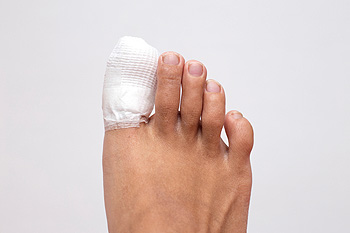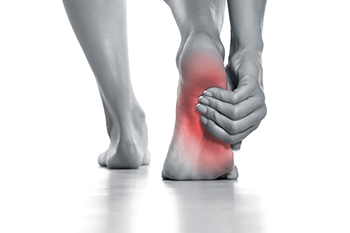Connect With Us
Blog

Wearing high heels can dramatically change the way a person walks by shifting the body’s weight forward and placing extra pressure on the front of the foot. This altered gait can lead to shorter steps and reduced balance, increasing the risk of stumbling or falling. In the short term, high heels often cause blisters, corns, and pain due to pressure and friction. The risk of ankle sprains also rises as the elevated heel makes the ankle less stable on uneven surfaces. Over time, consistent use of high heels may lead to the shortening of the Achilles tendon, which can result in stiffness or pain even when not wearing heels. Additionally, long-term wear can also affect posture and spine alignment, contributing to discomfort and musculoskeletal strain throughout the body. If you have foot pain from wearing high heels, it is suggested that you schedule an appointment with a podiatrist who can treat various foot conditions, and guide you on suitable heel choices.
High heels have a history of causing foot and ankle problems. If you have any concerns about your feet or ankles, contact one of our podiatrists from Complete Foot & Ankle Specialists, LLC. our doctors can provide the care you need to keep you pain-free and on your feet.
Effects of High Heels on the Feet
High heels are popular shoes among women because of their many styles and societal appeal. Despite this, high heels can still cause many health problems if worn too frequently.
Which Parts of My Body Will Be Affected by High Heels?
- Ankle Joints
- Achilles Tendon – May shorten and stiffen with prolonged wear
- Balls of the Feet
- Knees – Heels cause the knees to bend constantly, creating stress on them
- Back – They decrease the spine’s ability to absorb shock, which may lead to back pain. The vertebrae of the lower back may compress.
What Kinds of Foot Problems Can Develop from Wearing High Heels?
- Corns
- Calluses
- Hammertoe
- Bunions
- Morton’s Neuroma
- Plantar Fasciitis
How Can I Still Wear High Heels and Maintain Foot Health?
If you want to wear high heeled shoes, make sure that you are not wearing them every day, as this will help prevent long term physical problems. Try wearing thicker heels as opposed to stilettos to distribute weight more evenly across the feet. Always make sure you are wearing the proper shoes for the right occasion, such as sneakers for exercising. If you walk to work, try carrying your heels with you and changing into them once you arrive at work. Adding inserts to your heels can help cushion your feet and absorb shock. Full foot inserts or metatarsal pads are available.
If you have any questions please feel free to contact our offices located in Bellefontaine, OH and Springfield, OH . We offer the newest diagnostic and treatment technologies for all your foot and ankle needs.

A broken toe might seem minor, but it can be surprisingly painful and disruptive. Toe fractures happen from direct impact, like stubbing a toe on furniture, dropping something heavy on it, or even excessive stress from repetitive movements. There are different types of toe fractures. A stress fracture develops over time from repeated strain, common in runners and athletes. A non-displaced fracture means the bone has cracked but remains aligned, while a displaced fracture occurs when the bone shifts out of place. A comminuted fracture involves multiple breaks in the same bone, and an open fracture means the bone has pierced the skin, requiring immediate medical attention. Treatment depends on severity, ranging from taping the injured toe to its neighbor for stability to wearing a stiff-soled shoe. Severe cases may require a splint or even surgery to ensure proper healing. If you have severe pain from a broken toe, it is strongly suggested that you schedule an appointment with a podiatrist for appropriate treatment.
A broken toe can be very painful and lead to complications if not properly fixed. If you have any concerns about your feet, contact one of our podiatrists from Complete Foot & Ankle Specialists, LLC. our doctors will treat your foot and ankle needs.
What to Know About a Broken Toe
Although most people try to avoid foot trauma such as banging, stubbing, or dropping heavy objects on their feet, the unfortunate fact is that it is a common occurrence. Given the fact that toes are positioned in front of the feet, they typically sustain the brunt of such trauma. When trauma occurs to a toe, the result can be a painful break (fracture).
Symptoms of a Broken Toe
- Throbbing pain
- Swelling
- Bruising on the skin and toenail
- The inability to move the toe
- Toe appears crooked or disfigured
- Tingling or numbness in the toe
Generally, it is best to stay off of the injured toe with the affected foot elevated.
Severe toe fractures may be treated with a splint, cast, and in some cases, minor surgery. Due to its position and the pressure it endures with daily activity, future complications can occur if the big toe is not properly treated.
If you have any questions please feel free to contact our offices located in Bellefontaine, OH and Springfield, OH . We offer the newest diagnostic and treatment technologies for all your foot and ankle needs.

Arch pain can affect people of all activity levels. The arch of the foot supports body weight, absorbs impact, and helps stabilize movement. Pain in this area may be linked to plantar fasciitis, the most common cause, where the ligament connecting the heel to the toes becomes inflamed from overuse or strain. Another cause of arch pain is posterior tibial tendon dysfunction, which occurs when the tendon that supports the arch weakens or becomes injured. Cavus foot, a condition involving unusually high arches, may lead to instability and pressure-related discomfort. Overpronation, where the foot rolls inward excessively while walking, can also place undue stress on the arch and nearby joints. Risk factors such as weight gain, aging, and repetitive stress on the feet may contribute to these conditions. Arch pain is sometimes felt in the heel, ball of the foot, or ankle, and may worsen during or after standing or walking. If you have pain in the arch of your foot, it is suggested that you schedule an appointment with a podiatrist for an exam and appropriate treatment.
Foot Pain
Foot pain can be extremely painful and debilitating. If you have a foot pain, consult with one of our podiatrists from Complete Foot & Ankle Specialists, LLC. our doctors will assess your condition and provide you with quality foot and ankle treatment.
Causes
Foot pain is a very broad condition that could be caused by one or more ailments. The most common include:
- Bunions
- Hammertoes
- Plantar Fasciitis
- Bone Spurs
- Corns
- Tarsal Tunnel Syndrome
- Ingrown Toenails
- Arthritis (such as Gout, Rheumatoid, and Osteoarthritis)
- Flat Feet
- Injury (from stress fractures, broken toe, foot, ankle, Achilles tendon ruptures, and sprains)
- And more
Diagnosis
To figure out the cause of foot pain, podiatrists utilize several different methods. This can range from simple visual inspections and sensation tests to X-rays and MRI scans. Prior medical history, family medical history, and any recent physical traumatic events will all be taken into consideration for a proper diagnosis.
Treatment
Treatment depends upon the cause of the foot pain. Whether it is resting, staying off the foot, or having surgery; podiatrists have a number of treatment options available for foot pain.
If you have any questions, please feel free to contact our offices located in Bellefontaine, OH and Springfield, OH . We offer the newest diagnostic and treatment technologies for all your foot care needs.

